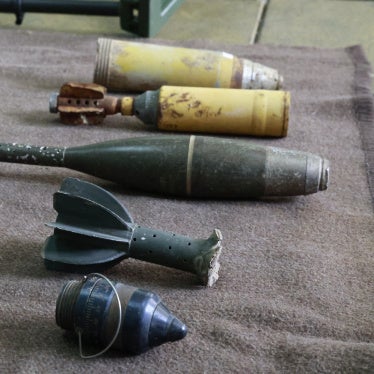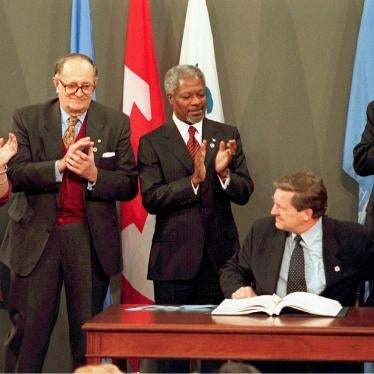Thank you Mr. President,
The Mine Ban Treaty has been successful in no small part because it has been characterized by the adoption of creative, flexible, and adaptable informal structures and mechanisms to carry out its work. It has operated this way in order to maximize the humanitarian impact of the treaty.
So it is only natural that after 15 years, States Parties continue to look for new and better ways to do things, ways that are responsive to new phases in the life of the treaty, as well as changing global realities.
In that context, the ICBL finds that, overall, these proposals provide a solid, cohesive, and appropriately innovative structure for the next five years of the convention. The proposals are an effort to be more streamlined, focused, and efficient in carrying out the business of the Mine Ban Treaty, and therefore more effective in meeting humanitarian objectives.
But these proposals should NOT be seen as reducing the ownership of the treaty by all States Parties. The continued engagement of all States Parties continues to be crucial. This should NOT be seen as putting implementation of and compliance with the treaty into the hands of a few.
And also crucially, the streamlined approach should NOT be seen as a signal that the work of the Mine Ban Treaty is done or that the Mine Ban Treaty is less of a priority than before.
Mr. President, we particularly like the structures designed to increase attention to and to more systematically and effectively address clearance and compliance, with mandates given to states to follow-up on those issues. Both are well-conceived initiatives that could make a significant difference in maximizing the humanitarian impact of the treaty.
The Article 5 Committee will certainly entail a great deal of work for a small number of States Parties, and we hope that this committee will make use of input from the ICBL, ICRC, and others, as has been the case for example for the analyzing group throughout its existence. We stand ready to contribute our technical expertise.
The same applies for the Cooperative Compliance Committee, where we will be ready to provide factual input, based on field research and other sources.
Similarly, we look forward to continued participation in the meetings of the Coordination Committee, as we have throughout its existence.
We thank the many States Parties that today have recommended that the ICBL be involved in all of these bodies, and who have suggested that the ICBL should be explicitly named in the proposal document.
We are less supportive of the proposed VA structure, which seems to give less weight to VA implementation than to other convention obligations and would not provide sufficient means to monitor implementation of the strong VA actions in the Maputo Action Plan. Our concerns would be addressed by the Austria-Costa Rica proposal, which we strongly support.
Mr. President, under the new meeting program and implementation machinery, all States Parties will need to remain focused on full implementation of the treaty, and on compiling and sharing information about their efforts. Article 7 reporting will still need to be as comprehensive as possible.
And, despite the reduced time frame and new approach for intersessionals, there should still be reporting and discussion on pressing issues, particularly with respect to compliance and by those encountering difficulties with implementation.
Intersessionals should not be reduced to an exercise in which committees talk and others listen. There must be an opportunity for states in question to respond to comments made by various committees.
We also believe that reporting on major treaty obligations at annual Meetings of States Parties should be specifically on the meeting’s agenda. It is not clear from paragraph 42 of the proposal how much space will be given to such reports.
The President has been accorded a rather extensive role in the proposal, including key responsibilities for universalization, stockpile destruction, and Article 3 mines retained for training issues. While there is no question that an active and engaged President can have a tremendous impact, other States Parties must remain engaged in these issues as well. All States Parties should feel a responsibility to promote universalization of the treaty. We should not accept that nearly 3 dozen nations remain outside this emerging norm.
For stockpile destruction, this remains a key issue, and could become even more so with further universalization of the treaty. There should be the opportunity at both intersessionals and annual meetings for those with stocks to report progress and potential difficulties, and to ensure all other States Parties that they are on track. And it would seem evident that the President’s mandate should make it a top priority to follow up with states that have missed their deadline.
In closing, the Mine Ban Treaty continues to be held up as the shining example of humanitarian disarmament, a treaty that puts the plight of victims and affected communities as the top priority, and a treaty that shows what can be accomplished when governments, international organizations, and civil society work together in common cause. These new structures and mechanisms can allow us to build on our successes in the years to come, to complete the job, and fulfill the promises of the Mine Ban Treaty.








